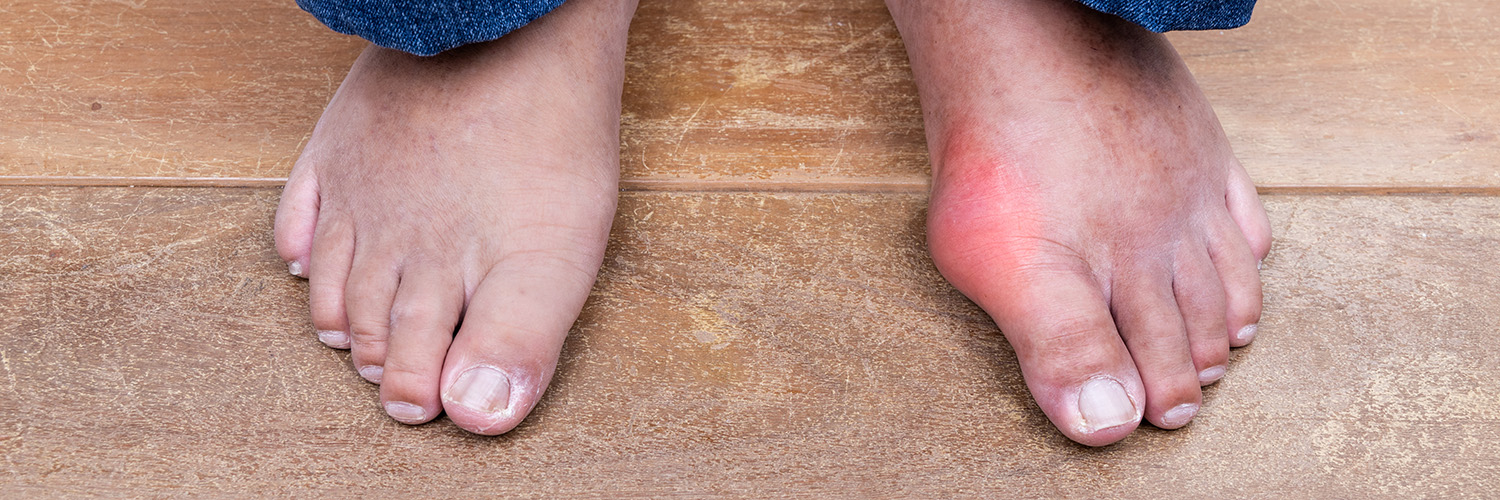
Gout
What is Gout?
Gout is a form of inflammatory arthritis caused by a buildup of uric acid crystals in the joints, most commonly affecting the big toe. It leads to sudden, severe episodes of pain, swelling, redness, and tenderness in the joints. Gout can occur in flares, with periods of intense symptoms followed by times with little to no discomfort. If left untreated, it can become chronic and cause joint damage. Gout is more common in men, postmenopausal women, and individuals with certain lifestyle or health risk factors.
What are the common symptoms of Gout?
Gout symptoms usually appear suddenly and may include:
- Intense joint pain, often in the big toe but also in the ankles, knees, elbows, wrists, or fingers
- Swelling and warmth in the affected joint
- Red, shiny skin over the joint
- Limited range of motion
- Lingering discomfort even after the initial flare subsides
Attacks often begin at night and can last from a few days to a week or more.
What are the common causes of Gout?
Gout develops when high levels of uric acid in the blood (hyperuricemia) lead to the formation of sharp urate crystals in the joints. Common causes and risk factors include:
- A diet high in purines (found in red meat, seafood, and alcohol)
- Excessive alcohol consumption, especially beer
- Obesity or rapid weight loss
- Certain medical conditions like hypertension, diabetes, or kidney disease
- Use of diuretics or other medications that raise uric acid levels
- Genetics—gout tends to run in families
The body either produces too much uric acid or doesn’t eliminate enough through the kidneys.
What are the common treatments of Gout?
Treatment for gout focuses on managing pain during flare-ups and lowering uric acid levels to prevent future attacks. Common treatments include:
- Nonsteroidal anti-inflammatory drugs (NSAIDs): Such as ibuprofen or naproxen
- Colchicine: A medication that reduces gout inflammation and pain
- Corticosteroids: Oral or injected to quickly control inflammation
- Urate-lowering therapies (ULTs): Like allopurinol or febuxostat to reduce uric acid over time
- Dietary and lifestyle changes: Limiting purine-rich foods, alcohol, and sugary drinks
- Increased hydration and weight management
Regular monitoring and long-term management can help prevent joint damage and frequent attacks.
When should I see a doctor about Gout?
You should see a doctor if:
- You experience sudden, intense joint pain—especially in the big toe or lower extremities
- Symptoms return frequently or worsen over time
- Over-the-counter pain relief does not help
- You notice swelling, redness, or warmth in your joints
- You have a history of kidney problems or other chronic illnesses
Early treatment helps control pain and prevent complications such as joint erosion or kidney stones.
If you are suffering from Gout or related issues such as gout symptoms, gout in toe, gout treatment, uric acid levels, gout pain relief, gout attack, gout medication, or signs of gout, get in touch with one of our experienced podiatrists today.
Schedule an Appointment TodayContact Us
Fill out the following form to get in touch with us:
Our Locations
Innovative Foot & Ankle
Kenilworth, NJ 07033908-276-6624
Bayonne, NJ 07002201-436-4287
Montclair, NJ 07042973-783-5101

